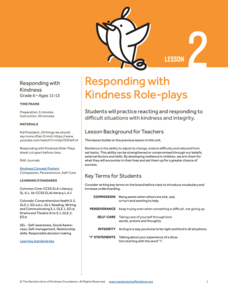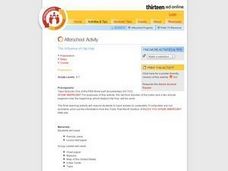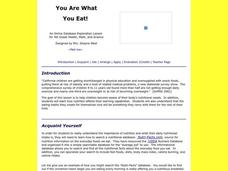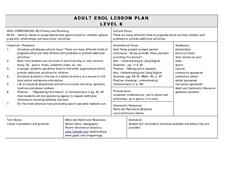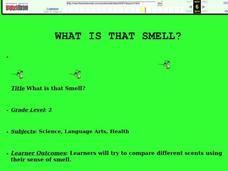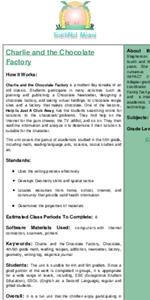Bully Free Systems
Bully Free Lesson Plans—12th Grade
Two sample lessons from a curriculum unit on bullying provide high school seniors with an opportunity to assess their online and cell phone behavior and to consider how they can offer support to bullied students. Each plan includes an...
Bully Free Systems
Bully Free Lesson Plans—Seventh Grade
Having a hard time defining bullying with your seventh graders? Discuss the different types of behavior one would see in a bullying situation with a series of lessons, worksheets, and group activities.
Random Acts of Kindness Foundation
Responding with Kindness Role-plays
Thank you. Excuse me. I'm sorry! Pupils watch a video about encouraging things people should say more often. Next, they work in small groups to develop a role-play based on a difficult situation. They perform their role-plays for the...
Curated OER
The Influence of Hip Hop
Students consider the influence of Hip Hop on their own language use and various segments of American society; they reflect on and demonstrate their knowledge of Hip Hop vocabulary and its use.
Curated OER
Nutrition and the Media: Cereal Box Consumerism
How many treats do you buy each week? Learners investigate diets and how the media tricks consumers into purchasing unhealthy snacks. They will investigate the designs and logos affiliated with cereal boxes and identify specific phrases...
DK Publishing
Real-Life Problems: Miles, Pounds, and More
Give young arithmeticians an applicable way to use their addition and subtraction skills with these five word problems. Each one presents a scenario requiring they add or subtract numbers with units (money, distance, weight,...
Department of Education (Ireland)
Consequences
11 lessons, designed to be used in consecutive order, ask middle and high school scholars to consider the effects of various drugs and the consequences of taking them for themselves and their families. They also develop the communication...
Curated OER
My World - Africa Scavenger Hunt
Students explore the lives of students living in Africa, learn African traditions, and compare and contrast their lives with the lives of African Students.
Curated OER
Character Traits - Who are We?
Sixth graders examine character traits. In this character education lesson, 6th graders set goals to strengthen particular personal character traits. Students watch their instructor model the character trait journaling strategy prior to...
Curated OER
How We Feel
Young scholars examine how their feelings make them unique. They read and discuss a poem, develop a list of feelings, and create a drawing of them feeling happy and healthy.
Curated OER
New York State Testing Program: English/Language Arts Book 1, Grade 3
This 3rd grade English/Language Arts standardized test practice worksheet includes 2 fictional selections and 2 non-fiction pieces, as well as multiple choice and free response questions.
Curated OER
You Are What You Eat!
Fourth graders discover the nutritional needs of their bodies. Using a database, they research how nutrition affects their learning capabilities. They take the food they eat on a daily basis and discover its nutritional value. They...
Curated OER
Germs Experiment 2
Students express artistic ideas thru art glitter and science. Students experiment with the theory of how germs spread. Students summarize findings in an art format. Students work in groups to analyze data.
Curated OER
Reduce, Reuse, Recycle and Respect
Second graders study the vocabulary that is associated with recycling and tell what recycling is. In this recycling lesson, 2nd graders use flash cards and Concentration type games to learn the vocabulary associated with recycling. They...
Curated OER
Literacy Activity: The Perfect Pet
Students develop their listening skills as they listen to the book The Perfect Pet. In this reading lesson, students listen to the book, and then talk about the pets they have. Then they make a graph as a class of all their pets.
Curated OER
How Quickly Disease Spreads
Students demonstrate how quickly disease spreads and the importance of protective measures with communicable diseases. They examine past epidemics such as the Bubonic Plague and make predictions about future epidemics.They compare and...
Curated OER
Just Say No to Drugs
Students explore the dangers of drugs, drug awareness and abuse and different types of drugs. They demonstrate reading comprehension sills including inference, literal meaning and critical analysis.
Curated OER
ADULT ESOL LESSON PLAN--Level 6--Family and Parenting
Students, after defining/reviewing an extensive list of vocabulary terms on the board, discuss and explore acceptable and unacceptable parenting skills with a variety of disciplinary practices to assist them.
Curated OER
What is That Smell?
Students identify various scents by using their sense of smell. In this five senses lesson, students smell items such as popcorn, mint, and lemon and identify the scents by only using their sense of smell.
Curated OER
Miss Tizzy
Students experience ways language and visuals bring characters to life in a story, experience age-appropriate songs, cooking experiences, and art, learn the days of the week in a new learning experience, and engage in hands-on learning...
Curated OER
Mended Hearts, Broken Hearts, Healthy Hearts, Half-Hearted
Learners integrate locomotor movements with nutrition information. They solve simple math functions related to the calories-per-gram contents of each nutrient and perform fitness activities to match the number of calories contained in...
Curated OER
Charlie and the Chocolate Factory
Fifth graders participate in a variety of math and language arts activities based on chocolate.
Curated OER
Designing Babies
High schoolers analyze current and emerging techniques used to select specific characteristics in offspring. They examine specific case studies and make ethical decisions based upon the Ethical Decision-Making Model.
Curated OER
Religion and Ethics: Living with Special Needs
Students explore human behavior by exploring mental and physical disabilities. In this learning disability lesson, students identify the different disabilities students have which prevent them from working at the same pace as the rest of...




